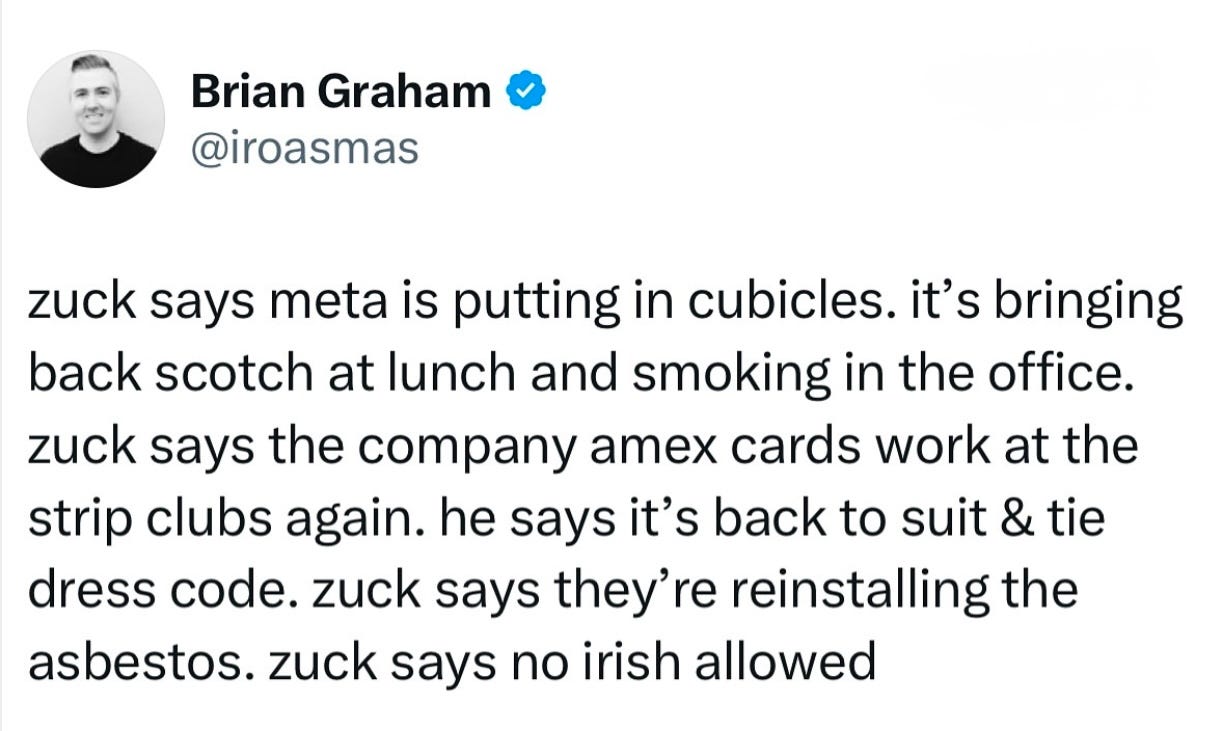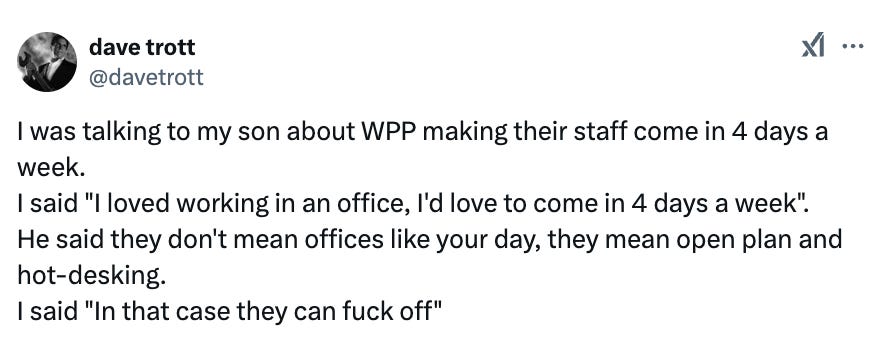The Work Identity Paradox will change our jobs
ALSO: AI can tell if your boss is depressed, how long before it comes for you?
Last week I was watching a TikTok from Yuval, one of my favourite creators on the app. Yuval is prodigiously intelligent, the sort of creator that the algorithm on YouTube Shorts or Reels never show to me (choosing instead to pump my feed full of Centrist Dad comedy that I utterly detest but that someone must have sent me once in a Whatsapp group and it’s polluted my stream). Yuval’s articulate brilliance characterises the delightful discovery that I love from the clock app.
I first followed him after one his frankly dazzling geolocation videos popped up in my feed. But he’s not limited to GeoguessrTok, he frequently offers explainers about science, politics and history. I love the guy.
The TikTok I was watching was about our jobs and our identity. In an emotional video as it looked like the Chinese-owned app might go dark forever he shared a story about how he’d once been a teacher, but had been forced to quit when the stress of the job overwhelmed him. He resigned to the school’s headteacher and soon found himself leaving the school.
It was walking out of the institution ‘when it dawned on me, that I’d never again walk into that building as a teacher again’. He confesses that he ‘just started crying’.
‘As much as I needed to leave I realised I was losing a huge part of my identity. As difficult as it was, teaching wasn’t just a job, it was who I was’.
He explains that the imminent closure of TikTok was a similar moment for him. After he’d lost his identity as a teacher, he’d ‘got his life back‘ when his posts started earning an audience.
Yuval understands identity well. In the aftermath of the assault on Gaza, Yuval, an American Jew, was hounded to apologise for the actions of the Netanyahu government. The suggested search on TikTok (unequivocally one of the worst bits of AI on the internet) frequently (falsely) suggested ‘Yuval anti Palestine controversy’. He responded with a grace and conviction that is immensely difficult to execute effectively in the furnace of social media.
Yuval’s conversation about his identity, first as a teacher, then as a TikTokker is relatable. For good or for bad we do feel that our jobs represent us. Having an identity that sees us as the hero in our lives is an important part of having healthy self esteem. The reason why so many employees want to know what their company policy is on Ukraine, on Gaza or (as someone told me this week) the stabbings in Southport is that we want to feel like our jobs represent us. They form a huge part of our identity. Adam Grant found that workers’ pride in their organisation correlated with employee engagement. If we feel that our company is doing good in the world, in turn we more easily believe that we are the goodies.
When our jobs change it disrupts one of the pillars of who we are.
And here’s the complication to this. Many of us aren’t sure that our jobs will exist in the future. Everywhere we turn we’re presented with the idea that AI is going to change our jobs.
We naturally tie our sense of identity to our jobs but paradoxically, jobs themselves are becoming less stable and more task-oriented. This is going to create tension: we crave purpose and belonging in our roles, but our roles are becoming more fragmented and temporary.
In the future our identity is going to be fluid and ever evolving. The anchor points that Yuval looked for will be gone.
Leaders need to understand this, that in the future work is going to be less about what we do and more about who we are becoming. The best organisations will be workplaces that understand identity and help employees author their own story.
This paper that measures CEO depression from earnings calls is superficially fascinating. The study trained an AI model on 189 non CEOs, 65 of whom suffered from depression. The model was then played the recordings of earnings calls and was asked to diagnose who was suffering from the condition.
Veteran leaders and female bosses were less likely to show signs of depression. Those who were missing earning forecasts were more likely to be depressed.
So how long before this comes to interviews? And how long after that before it comes to performance reviews? Initially fascinating, but with worrying consequences. Black Mirror episode incoming
As we start to see big differences in the RTO policies of different industries the FT asks if our hybrid working policy is becoming a tell of how old fashioned our sector is? ‘Are offices the new ties?’
"OpenAI's Whisper transcription tool is inventing large blocks of text in medical diagnoses": I'm a big booster for AI but stories like this are holding the whole sector back. In a study over half of the transcriptions included speech that hadn't happened (including accusing a patient of being a murderer, not ideal if you’re just about to go under to have your spleen taken out) - even when the audio was crystal clear. In the UK the Prime Minister has gambled that AI is going to stir the country out of a spiral of low productivity and slow growth, but these stories are worrying in both substance and future consequence
Trump’s henchman Stephen Miller last year told Mark Zuckerberg that the President was ‘going to go to war with DEI’. We know the rest…
“My travel costs will jump from £200 to £500 a month. This increase, combined with additional childcare expenses, will make it impossible for me to afford a house as planned”: great article about the fallout from WPP's RTO mandate
A lot of people rightly thought that the BBC Panorama about WFH was appalling. (An example of the criticism). One lowlight was the BBC’s Economics correspondent Zoe Conway asking someone if she thought WFH-ers were ‘selfish’ for not coming into the office to give business to struggling dry cleaning shops. Yes, I've barely had a payrise since Covid but here I go again selfishly keeping my coat out of Sketchleys. Felt worthy of GB News
Someone commented to a friend of mine last week, ‘I liked Bruce’s newsletter this week but there were a lot of typos in it’. So what do your typos say about you? Turns out it’s not good (unless you’re saying something emotional).
In this week’s podcast Professor Andrew Brodsky gives us a field guide to communications and tells how we should be rethinking how we message.
How did Shopify and Netflix reinvent their communication? How can any of us navigate a bulging calendar and overloaded inbox? Andrew’s new book Ping is out in February.







Thank you for this post it hit on something I've been thinking about for a long time - the role that companies are actually able to play in helping people develop.
As the over simplification goes: "there was a time when companies took care of you until retirement so long as you did what you were told. ". Yet now the world is different, dynamic, fast so we have to own our own development... Except that's also not really true. Companies often have the best understanding (in aggregate) of their needs and rough direction.
I sometimes think the dynamics today are more driven by a cultural desire to change easily and avoid conflict rather than inability. Companies could offer long-term employment and well structured development. It's much easier to have a culture where employees own their development - when things do change it makes the conversations easier and limits the complexity. I also think it doesn't help the company's long term success.
Companies succeed in the long term by doing things better than others in their space. Task focused employees rotating in and out, don't help that.
The future likely holds more of the same - lots of jobs which are task focused yet with a lot of underlying complexity. When allowed I would expect these AI tools to dominate in screening and selection of the "best" candidates from a mass of applicants.
Yet most employers for most roles struggle to get enough qualified candidates - depressed or otherwise.
I think the identity thing is important. However it’s mostly theoretical educated people that it’s important to. For blue collar jobs identity is less important. So be sure to avoid the bias from our lens through which we look at work.